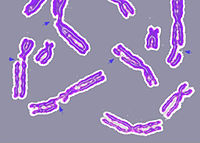
Photo from wikipedia
Background: The mechanism of DNA damage repair plays an important role in many solid tumors represented by cervical cancer. Purpose: The purpose of this study was to explore the effect… Click to show full abstract
Background: The mechanism of DNA damage repair plays an important role in many solid tumors represented by cervical cancer. Purpose: The purpose of this study was to explore the effect of DNA damage repair-related genes on immune function of patients with cervical cancer, and to establish and evaluate a prognosis model based on DNA damage repair-related genes. Methods: In the study, we analyzed the genes related to DNA damage and repair, and obtained two subtypes (F1 and F2). We selected two groups of samples for different selection, and studied which pathways were enriched expression. For different subtypes, the immune score was explored to explain immune infiltration. We got the key genes through screening, and established the prognosis model through the key genes. These 11 key genes were correlated with the expression of common Clusters of Differentiation (CD) genes in order to explore the effects of these genes on immunity. Results: Through the Least absolute shrinkage and selection operator (LASSO) method, we screened 11 genes from 232 candidate genes as the key genes for the prognosis score. Through the Kaplan-Meier method, four genes (HAP1, MCM5, RNASEH2A, CETN2) with significant prognostic significance were screened into the final model, forming a Nomogram with C-index of 0.716 (0.649–1.0). Conclusion: In cervical cancer, DNA damage repair related genes and immune cell infection characteristics have certain association, and DNA damage repair related genes and immune cell infection characteristics can effectively predict the prognosis.
Journal Title: Frontiers in Genetics
Year Published: 2022
Link to full text (if available)
Share on Social Media: Sign Up to like & get
recommendations!